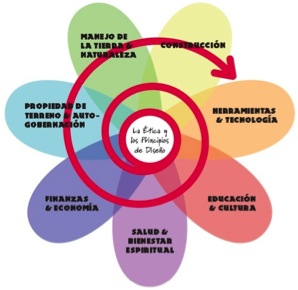THE FARM OF THE POSSIBLES
(Heritage Integral Rehabilitation and Social Transformation)
We live in a historical time when urgency of taking action affects all dimensions of life. We offer a local response to these urgencies.
We feel the urgency to protect, create, share, inspire, innovate, in few words; infuse meaning in the drift of the definition of the word coexistence
Urgency to safeguard a heritage property
The hacienda Jesús del Valle (JDV) located on the margin of the Darro River in the municipality of Granada, was catalogued Property of Cultural Interest (BIC) by the Andalusian Historical Heritage on the 27th of May, 2005. The farm includes (4176m2 of edifications and 650m2 of space for livestock) and 400 hectares of agricultural and forestry land. The Society of Jesus established itself in the Darro valley from 1583 until its expulsion from Spain in 1767. “On the one hand, the Jesuits played a leading role in the life of the city, a period where the San Pablo college became one of the most important centres of education in Andalusia. On the other hand, their farming and animal husbandry model was one of efficiency, the production supplied the different Jesuit centres and the college. The farm served as a retreat for fathers and students “(GESTO 2003: 2-3)[1].
The farm is currently in a deplorable state, which does not correspond in any ways to the criteria of a catalogued heritage property. In accordance to the historical value of the farm, our primary objective is to revitalise its soil to restore its fundamental role in the life of the city. Our intention is to use the knowledge of that time to restore the buildings as they were built in the Sixteenth and Seventeenth centuries. In this sense, the original architectural plans of the farm are in complete harmony with the landscape that surrounds it. South orientation to maximise passive solar energy, housing and agricultural buildings close to each other for labour efficiency, extensive agriculture conserving biodiversity and facilitating the use of in situ construction materials. At its peak, the farm JdV operated 2000 hectares. Knowing that it is possible to feed 200 families (4 individuals/family) with a garden of one hectare (Fortier, 2012: 30)[2], we can conclude that the farm supplied to an important extent the city of Granada.
[1] GESTO Patrimonio Cultural S.L. Junio 2003. Expediente para la incoacion de inscripcion especifica del Cortijo-Hacienda Jesus del Valle. Granada.
[2] Fortier, J.-M. 2012. Le Jardinier-Maraîcher. Manuel d’agriculture biologique sur petite surface. Écosociété: Montréal.
Urgency to reinvent social relations
Our proposal is to work from the Three Ecologies of the philosopher-activist Félix Guattari[3]. Following Guattari ideas, our survival on this planet is threatened not only by environmental degradation, but also by the degeneration of the fabric of social solidarities. Our psychic modes of living must be literally reinvented based on ethical-aesthetic articulation between the three ecologies: environmental, social, and mental. This articulation will be implemented in our governance operative system at the micro-political organisation level, as well as in the collaborative learning process between the farm team and the public-private-civil institutions involved both locally and globally. In simplified terms, we will offer practical training and transitional residency of activities related to the farm productive system to the citizens, students (of any age), people living with mental health problems, in socio-professional reintegration, teachers, professionals, artists with the aim to rethink how we relate and learn from each other from a self-sufficiency standpoint; as individuals and as a community.
[3] Guattari, F. 1989. Les trois écologies. Éd. Galilée: Paris.

Urgency to create functional ecosystems
Permaculture is a generic term that encompasses the application of ethical criteria and universal design principles in terms of planning, development, maintenance, organisation and preservation of a self-relying habitat to support future life. The central axes are food production, energy self-sufficiency, landscape design and organisation of social (Infra) structures. The principles incorporate renewable energy and the implementation of materials life cycle in the sense of a sustainable use of resources at the ecologic, economic and social levels[4].
We will apply the ethical principles and design of permaculture as a guide to the practice of the transformation of our relationship with nature and people by developing functional ecosystems on the 400 hectares of the property. According to David Holmgren (2002)[5] co-creator of the permaculture concept with Bill Mollison in 1978, we will have in mind:
- Earth care
- People care
- Fair share – surplus distribution and cooperation
[4] (http://es.wikipedia.org/wiki/Permacultura)
[5] Holmgren, D. 2002. Permaculture. Principles & patways beyond sustainability. Holmgren design services.
Urgency of sustainable innovations for the coming generations
Our project is transcultural and transdisciplinary and we aim at developing an integral education program. Integral education is defined as the learning from significant practical experiences from intellectual disciplines and practical knowledge in order to develop a community where the fabric of social solidarities is reactivated. We will apply the values of integral education (equality, cooperation, autonomy, interdependence, sharing, frugality and individual and collective empowerment) in order that the farm JdV:
- Serve as a place of transdisciplinary and collaborative learning
- Allow to apply these learning at the personal and social levels
- Serve as a meeting place for the exchange of traditional knowledge and the application of new technologies and sustainable innovations of contemporary research.
- Transmit to the participants of all ages the potential of community self-organization



